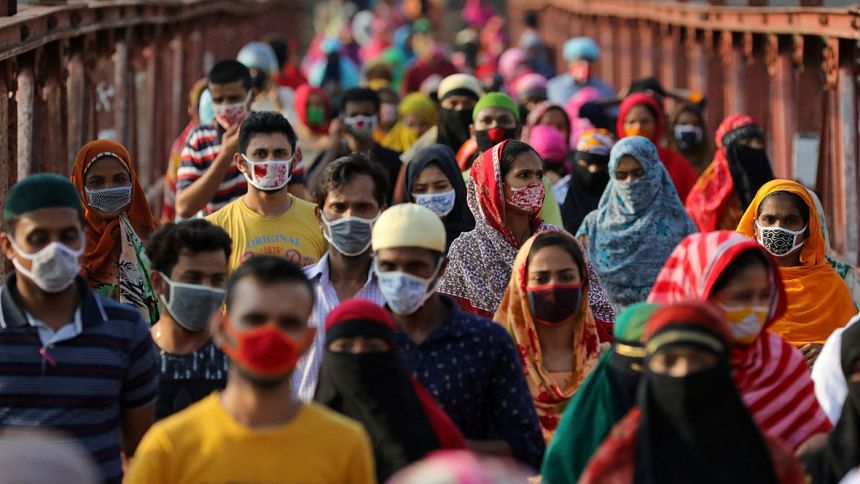Strengthening Covid-19 response to save lives and build a healthier future

For more than nine months now, the WHO and its Member States in the South-East Asia Region have responded to the Covid-19 pandemic with speed, scale and solidarity. Speed, in efforts to control local outbreaks by acting on epidemiological evidence. Scale, in the whole-of-government, whole-of-society buy-in that leaders have mobilised to help people stay safe, healthy and well amid our "new normal". And solidarity, because from the beginning of the outbreak, countries have reinforced each other's defences, whether by sharing key resources or identifying and communicating best practices.
To strengthen the response and save lives, national and local authorities must continue to apply the WHO's transmission classification model while learning from each other's successes in preventing and controlling hotspots and clusters, which account for the majority of new cases. Fast and frugal innovations—for example, universal mask wearing, the provision of hand hygiene resources and safe water to all communities, and the delivery of high-quality information including locally tailored risk communication—have proven especially valuable, and should be leveraged to maximum effect.
The Member State resolve to control Covid-19 remains steadfast, as it must be. In early September, at the WHO's annual governing body meeting in the Region, countries issued the Declaration on the Collective Response to Covid-19, highlighting their commitment to build on the Region's many strengths in responding to the pandemic. Of particular focus was securing the occupational safety of health workers, strengthening health information systems and the uptake of digital health technologies, and advancing health policy and systems research on Covid-19.
Crucially, the Region reaffirmed its commitment to strengthen and maintain essential health services, which is a core pillar of the WHO's strategic preparedness and response plan and has been one of the Region's key points of focus. Across the world, the emergence and spread of Covid-19 has caused significant disruptions to essential health services, risking increased morbidity and mortality from non-Covid health issues. Our Region is no exception.
To overcome such disruptions, countries have applied a range of measures that address demand and supply-side barriers—for example, task-shifting among health workers, leveraging the potential of telemedicine, developing novel supply chains and medicine dispensary options, and better engagement with the private sector. These and other solutions must continue to be applied to ensure all people can access the services they need to stay healthy, well and productive throughout the pandemic.
But more than nine months into the response, additional investments in health are needed, not only to strengthen the response and save lives, but also to enhance health system resilience into the recovery and beyond. Countries face hard choices amid intense fiscal pressures. The latest projections from global financial institutions suggest that in 2020 most countries in Asia Pacific face a decrease in GDP, which could exceed 10 percent.
But investing in health is proven to promote the sustainable social and economic development upon which progress in all policy areas relies. In ordinary times, every dollar invested in health yields an average return of between USD 2-4, which can be up to 20 times higher in low- and middle-income countries. That return is multiplied many times over when one considers how investments in common goods for health can protect against acute public health events, the impact of which is now clear to all.
The WHO will continue to provide Member States its full technical, operational and material support, including by mobilising international and global partners. Despite a near-global shutdown, the WHO has rapidly procured and delivered critical personal protective equipment and laboratory supplies to all countries in the Region and continues to bring countries and partners together via the WHO-supported partners platform and central supply portal.
Through its Solidarity trials, the WHO is facilitating Member State participation in global research and development efforts, and through the Access to Covid-19 Tools Accelerator and COVAX Facility, the WHO is working to ensure all countries have access to the life-saving goods such efforts produce. The WHO will continue to support Member States in the Region to strengthen the policies and delivery systems required to efficiently and equitably roll out a safe and effective Covid-19 vaccine once developed.
No outbreak is too big to control, and it is never too late to aggressively apply the basic public health measures that we know work. The WHO will continue to support all countries, whatever the transmission scenario, to apply the evidence-based interventions needed to control the spread of Covid-19 and save lives. We will continue to support all countries to achieve the healthier, more health-secure recovery and future to which we strive.
Dr Poonam Khetrapal Singh is the WHO South-East Asia Regional Director.

 For all latest news, follow The Daily Star's Google News channel.
For all latest news, follow The Daily Star's Google News channel. 



Comments